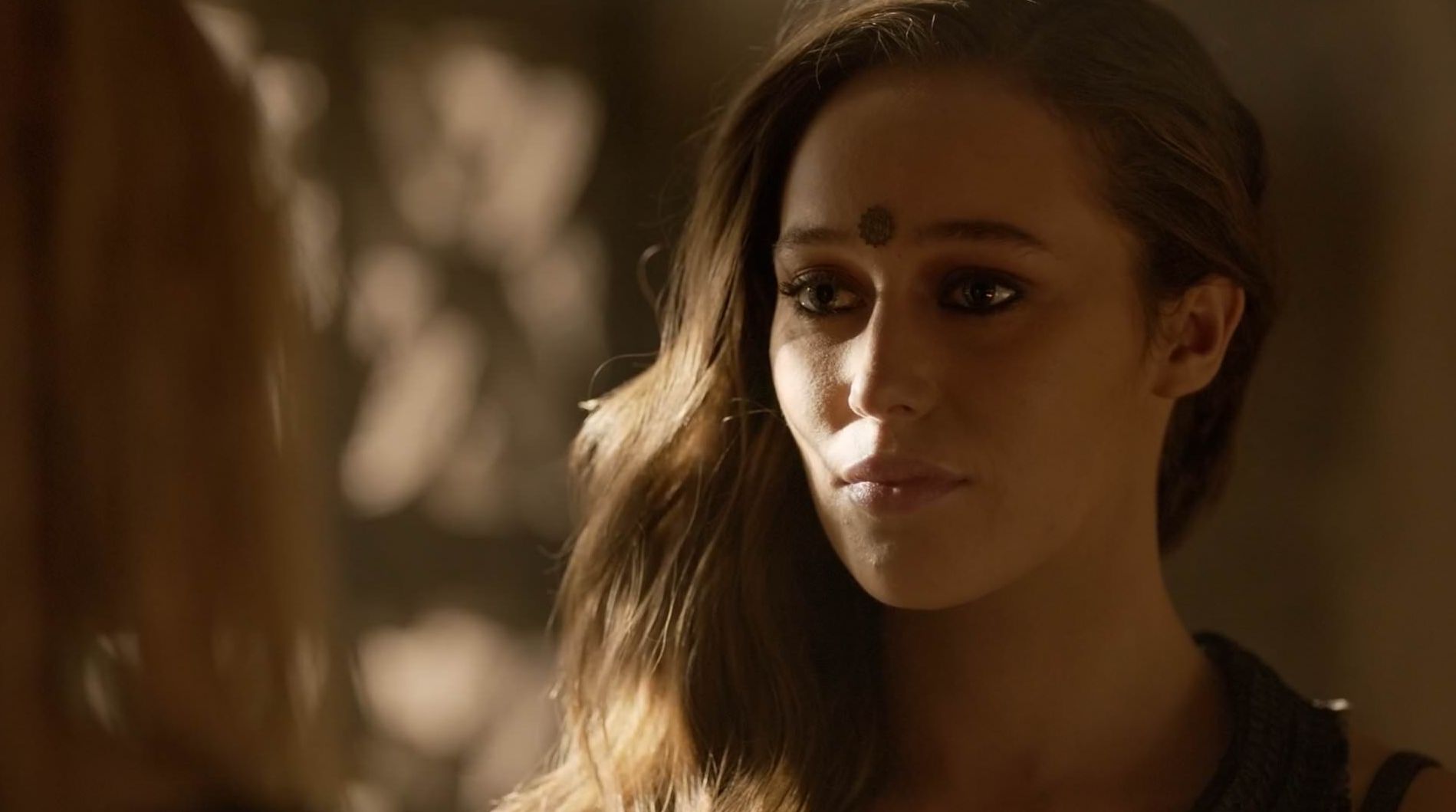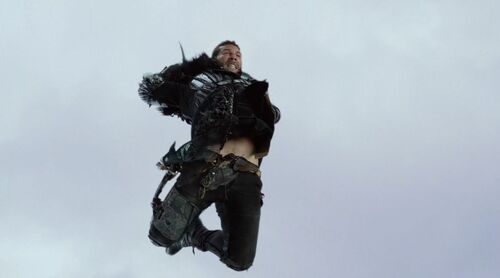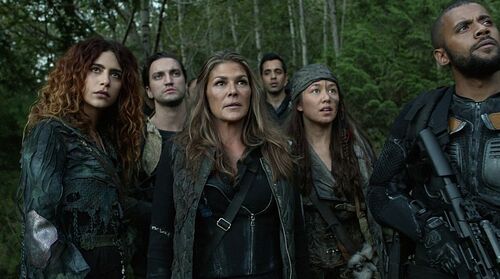
The 100 S3E7: "Thirteen" Review and Analysis
 Thirteen interweaves an essential origin story with its tragic, present ramifications to create a powerful, but controversial, episode of television.
Thirteen interweaves an essential origin story with its tragic, present ramifications to create a powerful, but controversial, episode of television.
Note: Spoilers for Penny Dreadful season two and Supernatural season eleven.
LET'S GET RIGHT TO IT: LEXA'S DEATH
The 100 has telegraphed Lexa’s death since Survival of the Fittest (Season 2, Episode 10). In that episode, Lexa tells Clarke that her spirit will choose the next Commander in a kind of reincarnation. This season alone Lexa has talked to Clarke about her death several times. She introduced Clarke to Aden, Lexa’s choice for the next Commander. Queen Nia attempted to have Lexa overthrown and most likely killed. Roan and Lexa battled and that should have been to the death. In this episode even, Semet, the Grounder villager who captured Octavia and brings news of the Sky People’s latest atrocity, tries to assassinate her. The spectre of death loomed large over Lexa.
So, Lexa dying is not a surprise or a shock to me. Not only did Lexa’s arc this season practically scream OMINOUS FORESHADOWING OF DEATH, her death was needed to push the next phase of the story forward. Yes, it has been argued that she could have just been written off into the sunset or banished. However, as we discover through both the flashbacks and Titus’ ritual after Lexa dies, the “Commander’s Spirit” is actually a neural implant that Becca brought to the ground. Removing it would potentially kill her, and it would have to be removed to be given to her successor.
For the purposes of the show, then, Lexa’s death works. It is significant and given significance. Nothing will ever be the same again, not Clarke nor her quest for peace, not Titus, not the Council, not the politics on the Ground. Nothing. Her death also tied in mythological aspects that have been building since Survival of the Fittest. Now we know what she meant by the “Commander’s spirit”—technological reincarnation. Lexa, in some respects, operated as an AI, which blows open huge doors for rich, complex storytelling. Some of that will be best illustrated by seeing how the Conclave chooses the next Commander from the Nightbloods, and what happens when the chosen novitiate has the flame implanted.
However, television and entertainment isn’t consumed in a vacuum. Lexa was a lesbian woman killed off immediately after having sex. Not only that, she was killed off by a stray bullet from Titus, meant for Clarke, in a half-baked assassination attempt. This checks all of the boxes for the Bury Your Gays/Dead Lesbians television trope. If you doubt that there is such a thing, recent examples include Charlie from Supernatural and Angelique from Penny Dreadful, and that’s just off the top of my head.
Though Lexa’s death works on a number of story levels, it also the embodiment of that painful trope. Does it working in the story negate the trope? No. Does being a trope negate its significance to the story? No. Are all tropes lazy writing? No, not always. Was this lazy writing? Yes. But how to fix it? Honestly, I don’t have a good answer except to go all the way back to rewriting the entire season and leaving out the romance between Clarke and Lexa. There is plenty of story material to dig into when you have two political leaders choosing peace despite the chasm of betrayal and star-crossed attraction between them, without adding in the romantic aspect of the relationship. In the end, however, the writers chose a full-blown romance. So given that choice, how could they have made this inevitable death significant, but less excruciating for those who viewed Lexa as essential representation? Separating the love scene from her death sure seems like an obvious place to start.
I can’t judge on what might have been if. This is what was written, and it is the ever unsatisfactory answer of: can’t it be both? In my opinion, yes. It is both a story choice that works and a regrettable use of a trope that could have been avoided if different choices had been made at the beginning of the season.
FLASHBACKS AND COMPARATIVE MYTHOLOGY: TITUS AND MURPHY, BECCA, AND POLARIS
What is a myth? What is religion? Where and how do they intersect?
In two fantastic scenes between Titus and Murphy, The 100 starts to broach this question, and I couldn’t be more excited about it. Already this season Wanheda became a legend, and though Clarke isn’t using that title now, it’s still there waiting to be picked up. Now, though, as Titus interrogates Murphy on the ALIE chip, and as flashbacks to Polaris 97 years ago are woven into the tapestry, it is clear that the Sky People and the Grounders share an origin story.
Ninety-seven years ago Becca created ALIE 1.0, and ALIE’s primary directive was to make life better. ALIE 1’s conclusion was that there were too many people on Earth. Sometime between ALIE 1’s conclusion and the nuclear apocalypse she initiated, Becca, her creator, went to space to work on ALIE 2.0. It seems that ALIE 1 is a traditional AI that, until she and Jaha created the chip, was limited to the confines of servers and hardware supported by the solar panels and the mansion she was confined in. Becca created ALIE 2 to be a basal neural implant that interfaced with the brain to become a much more powerful, but more human, artificial intelligence. This is the basic philosophy of transhumanism: that eventually technology and humans will merge to expand the capacity of both. Technology will attain more humanity, while humans attain greater knowledge and capabilities.
In creating ALIE 1, Becca destroyed the world. In creating ALIE 2, she believed she could save the rest of humanity. Commander McAdams, the leader of Polaris, disagreed and stopped docking procedures with the Ark so that ALIE wouldn't infect the other stations. And who could blame him? Becca might believe ALIE 2 could save humanity, but it was based on a program that blew up the world. So Alpha Station gave Polaris, and Becca, an ultimatum: resume docking or be destroyed. Tragically, Polaris didn't move fast enough.
Becca implants the neural interface herself (…ouch!), injects herself with a mysterious black liquid (that looks a lot like nightblood), and escapes in a pod down to Earth. As her pod speeds towards the ground, Alpha Station decides to blow up Polaris anyway as an example to the other stations. When Becca arrives on the ground with a spacesuit emblazoned with COMMANDER, people in radiation suits are walking towards her.
The scene of people walking towards Becca is depicted in Titus’ lair. So is the figure of Becca, and the infinity symbol that is on both the ALIE 1 City of Light chips as well as the ALIE 2 “flame” chip. Once Titus stops beating Murphy, Murphy starts putting the pieces of the puzzle together—and only he can. He’s the only one that knows ALIE 1, is from the Ark, and is now seeing the murals depicting Becca and the nuclear fallout.
Titus, a man of tradition and rules, simply cannot believe Murphy as he relays the Sky People’s version of these events. Every word this Sky Person says to him is not only offensive, but heretical. Titus identity and his place in society is predicated on the myths he believes and the rituals that he enacts because of them. It will be fascinating going forward to see how widely spread these myths are, and whether or not they constitute a formal religion among the Grounders.
The compelling dichotomy here is that Murphy, and the Sky People at large, have never been presented as particularly religious. Kane’s mother, Vera, had a small group that kept a tree alive on the Ark, which he planted after arriving on the ground. Finn told the story of the fabled Thirteenth Station during they festivities on Unity Day (Season 1, episode 9). Other than that, survival has been the utmost importance. But as Murphy looks over the murals and begins to realize that this story is his story, there’s a glimmer of something—excitement? Fascination? in his eyes. It’s subtle and fantastic work by Richard Harmon, and the decision to have sarcastic, nihilistic Murphy be the one to discover this information was brilliant.
FRIENDSHIP BETWEEN WOMEN: OCTAVIA, INDRA, AND CLARKE
Octavia Blake is the hero we needed in the Polis story. Semet brings her to Polis after capturing her at the end of Bitter Harvest. She tried to save both the Grounders and the unit from Arkadia sent to clear the village and failed. After Lexa denies Semet immediate justice, and instead forces a blockade around Arkadia with a kill order for any Sky Person outside the boundary, Semet tries to kill Lexa. He is summarily dispatched by Titus, and Octavia is free to talk to Clarke.
And thank goodness she does. For several episodes, the plotlines and characters surrounding Clarke in Polis have been interesting, but Clarke herself has lacked any clear agency. She has been mostly reactionary to the plots and intrigues in Lexa's court, and her decisions always revolve around her staying in Polis instead of fighting for her people in Arkadia, where they need her most. Maybe she truly believed staying was the best way to help them, but that never played well to me, especially when she was faced with the crimes Pike and Bellamy were committing. Clarke retreating back to the comfort of Polis while those she loved suffered, and not actively helping them, created a huge amount of character dissonance.
What was clear was that Clarke used being an ambassador in Polis as a way to escape her problems. That’s revealing as a measure of her trauma, but can only be sustained for so many episodes, especially considering the dire circumstances of Arkadia. Enter Octavia. The first thing she says upon viewing Clarke’s lush quarters is, “No wonder you chose to stay.” Clarke is immediately defensive and reverts to the condescending tone she takes with Octavia. Octavia isn’t having it, and she pushes Clarke on her decision to trust Lexa. Octavia may consider herself a Grounder, but she doesn’t trust the Commander. Her loyalties are to individuals, not to authority.
Clarke leaves and commands Octavia to stay put. Octavia—"yeah, right”—Blake instead goes out to search for Indra, who was shot during Pike’s massacre of the peacekeeping forces at the end of Watch the Thrones. Indra is not healing well, and when Octavia tries one of the patented Blake Motivational Speeches, it doesn’t work. At least, not right away.
Octavia goes back to Clarke to try and cajole her into returning. It’s the softer version of the motivational speech, and in this moment, we finally see how much Clarke is hurting, how afraid she is of going back to face her own brokenness. Octavia can sense it too, and softens her tone, even reaching out to hold Clarke’s hand. We need you, Octavia says, your people need you. Be ready to leave in an hour. As Octavia leaves the room though she lands the final blow: If you’re not there, you’re not the person I thought you were.
Clarke, locked in the tower with Murphy after the death of Lexa, wasn’t there to meet Octavia. Disappointment and anger war on Octavia’s face as she starts to stride out of Polis alone.
But then, Indra calls her name! They stroll out of Polis together, off to seek their revenge.
Strong, supportive, and nuanced friendships between women are not often portrayed on television. The 100 excels at this, as the conversations between Clarke and Octavia demonstrate. Octavia is both stern and gentle, compassionate and insistent. However, The 100 also provides two examples of older women mentoring younger women, both with Abby and Raven and also Indra and Octavia. As rare as female friendship is on TV, this maternal, mentor-type relationship is even less common. It’s great writing, but also another example of a show that, for its faults, also has incredible strengths in characterization and nuanced, fresh development.
THE REVIEW
Thirteen is a difficult episode to review, and even more challenging to ascribe a rating to. Most of Thirteen was an accomplished hour of television: the haunting opening as bombs rained down on the world, Murphy alighting to the Sky People’s history, the friendships between Octavia and Clarke and Octavia and Indra, as well as the direction, editing, and performances. The performances and direction elevated Lexa’s death scenes into wrenching heartbreak as both Titus and Clarke grappled with losing a beloved.
However, the loving and beautiful sex scenes between Clarke and Lexa followed immediately by Lexa’s tragic death has left me with a lingering feeling of distaste, for any number of reasons. It is my opinion that this damaging trope could have been avoided at many other points in the structuring of this season if the writers had been willing to make some hard choices.
Because of the nature of this episode, I added the subscore "Use of Trope" to fully reflect my feelings on the matter. The rest of the episode was excellent, but the use of such a terrible plot device should be noted while not reflecting on the amazing work of the actors, director, and other fantastic elements of the story.


